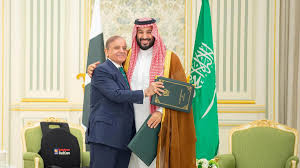Shifting sands: On the defence agreement between Saudi Arabia, Pakistan
India’s West Asia policy must maintain a strategic balance.
The signing of a mutual defence agreement between Saudi Arabia and Pakistan, which declares that “any aggression ... shall be considered an aggression against both”, is a moment of consequence for both countries as well as for West and South Asia. Saudi Arabia, the custodian of Islam’s two holiest mosques, and Pakistan, the Islamic world’s only nuclear power, have always enjoyed a special relationship. Pakistan has trained Saudi forces for decades, while the kingdom has provided generous financial assistance, including help for Islamabad’s nuclear programme. With the agreement, this partnership has now been institutionalised. Yet, its timing, announced a week after Israel bombed Qatar, underlines the shifting sands in the Persian Gulf’s security landscape. For decades, its monarchies relied on solid security guarantees from the U.S. But with the U.S. focus shifting away from West Asia, the durability of the old framework has come into question. When Saudi oil installations were attacked by Iranian allies in 2019, the U.S. did nothing. Israel’s attack on Qatar, which hosts America’s largest base in West Asia, seems to have expedited the realignment.
In the Abraham Accords, the U.S. tried to bring the Arab monarchies and Israel closer to build a common front against Iran. Four Arab countries, including the UAE, signed up, and Saudi Arabia was expected to follow. But the Hamas attack of October 7, 2023 and Israel’s Gaza war, which has spilled into other countries, have derailed the process. With the Pakistan agreement, Saudi Arabia is sending a clear signal to Washington and Tel Aviv that it is diversifying its security alliances. For Pakistan, which desperately needs Saudi financial assistance, closer defence ties at a time when Gulf monarchies are rattled by Israel’s unchecked militarism, are an opportunity to present itself as a security provider. For India, which fought with Pakistan in May, the agreement could complicate its manoeuvres in West Asia. As India has taken a pro-Israel tilt, Arab monarchies seem to be hedging their bets, even if that means overlooking India’s concerns. Yet, it is not clear whether the agreement offers Pakistan’s nuclear umbrella to Saudi Arabia or an immediate Saudi response if Pakistan comes under attack. Risks of entrapment come with the agreement: Pakistan could be dragged into West Asia’s polycrisis or Saudi Arabia could be pulled into the tensions in South and Central Asia. India must prepare for rapid changes in West Asia’s security order. It might be tempted to double down on its tilt towards an isolated, dangerous Israel. That would be a mistake. Instead, India’s long-term focus should be on promoting stability in the region, and maintaining a strategic balance among all pillars of its West Asia policy.
